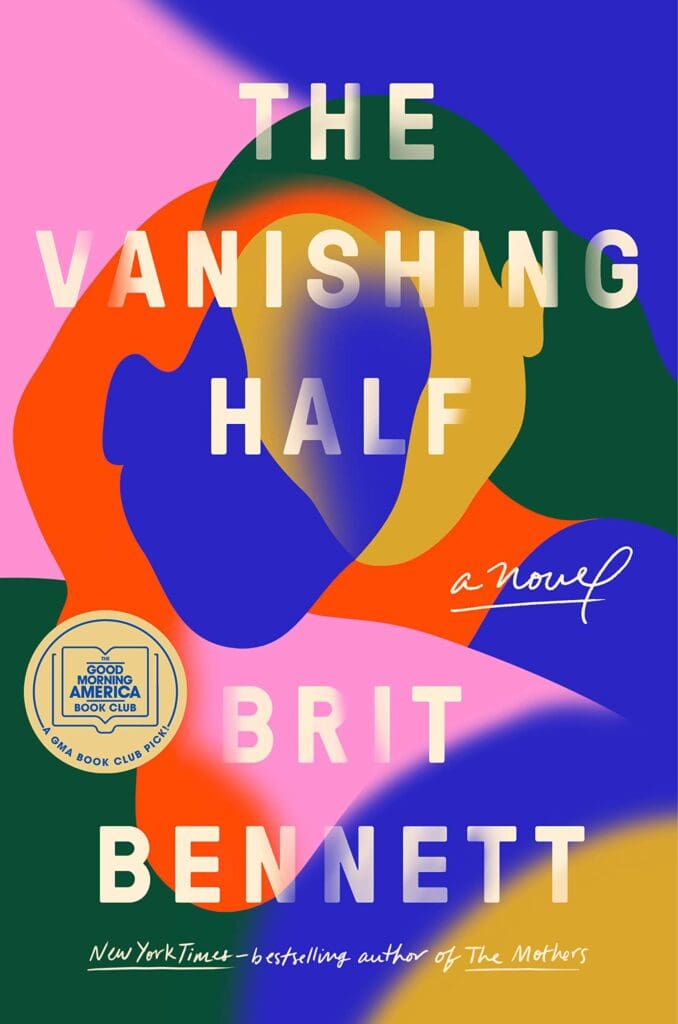Brit Bennett’s second novel, The Vanishing Half (352 pages; Riverhead Books), is an enthralling addition to the literature of passing: novels about taking on an alternative racial identity that often explore the concept of race as performance. The Vanishing Half is powered by its reflections on deception, motherhood, and love, and where they intersect. Whereas other novels about passing, such as James Weldon Johnson’s 1912 novel, The Autobiography of an Ex-Colored Man, focus on the arbitrariness of racial constructs, Bennett’s novel studies the self-inflicted psychological and social repercussions of passing and the alienation of self.
Beginning in the 1960s, the novel tells the story of the Vignes twins, Desiree and Stella, who are born into a light-skinned Black community in Northern Louisiana called Mallard, a territory so small that most maps overlook it. Mallard is a “third place,” founded by in-betweeners “who would never be accepted as white but refused to be treated like Negroes.” At the age of sixteen, the girls become runaways, fleeing to New Orleans, living together—but barely surviving in low-wage jobs and dilapidated housing. When Stella finds work as a secretary in the marketing department of the Maison Blanche chain of stores, where Blackness is otherwise a barrier to employment, Stella begins to feel the allure of “passing over” into whiteness, and disappears from Desiree’s side to lead a new life with her white lover, the head of marketing at her company.
Desiree eventually leaves New Orleans but returns much later to Mallard with a daughter, Jude, whose “blueblack” skin draws stares and whispers from community members. Having lived the previous fourteen years in Washington, D.C., she arrives in Mallard fleeing from an abusive relationship. Soon, Desiree runs into an old flame and settles in, staying much longer than anyone expected. She spends years trying to find Stella, but to no avail. As the story progresses, Jude becomes the narrative’s epicenter, driving us with her across country to California, where she will attend UCLA.
All the while for Stella, who is on the West Coast with a husband and a daughter, there is the ever-present shadow of being found out. Lies circle over her like hawks, waiting for a moment of weakness to strike. “Lightness, like anything inherited at great cost,” Bennet writes, “was a lonely gift.”
Although we live in a world of constructs, the novel shows how one thing inevitably leads to the next, and the truth catches up to you, even if everything feels unreal at times. As Bennett writes:
That was the thrill of youth, the idea that you could be anyone…Then adulthood came, your choices solidifying, and you realize that everything you are had been set in motion years before. The rest was aftermath. So [Stella] understood why her daughter was searching for a self, and she even blamed herself for it. Maybe something in the girl was unsettled, a small part of her realizing that her life wasn’t right. As if she’d gotten older and started touching the trees, only to find that they were all cardboard sets.
Spanning decades, told deftly and assuredly, The Vanishing Half tells a story of passing in which the harm Stella faces as a result of her actions is largely self-inflicted. But like other members of the wealthy, white elite, she cannot retain her status without inflicting harming on others as well. In fact, she becomes so alienated from herself to the point of being enraged upon learning of a Black family moving next door to her in Brentwood.
Bennett is not interested in dooming Stella to tragedy in the same way literature has punished other characters for taking on a new racial identity, such as in Nella Larsen’s Passing. Our world, after all, is unfair, deliberately and arbitrarily. It’s a tapestry of false conceptions with real-life implications, but as Stella proves, it doesn’t make living a lie any more conscionable.

